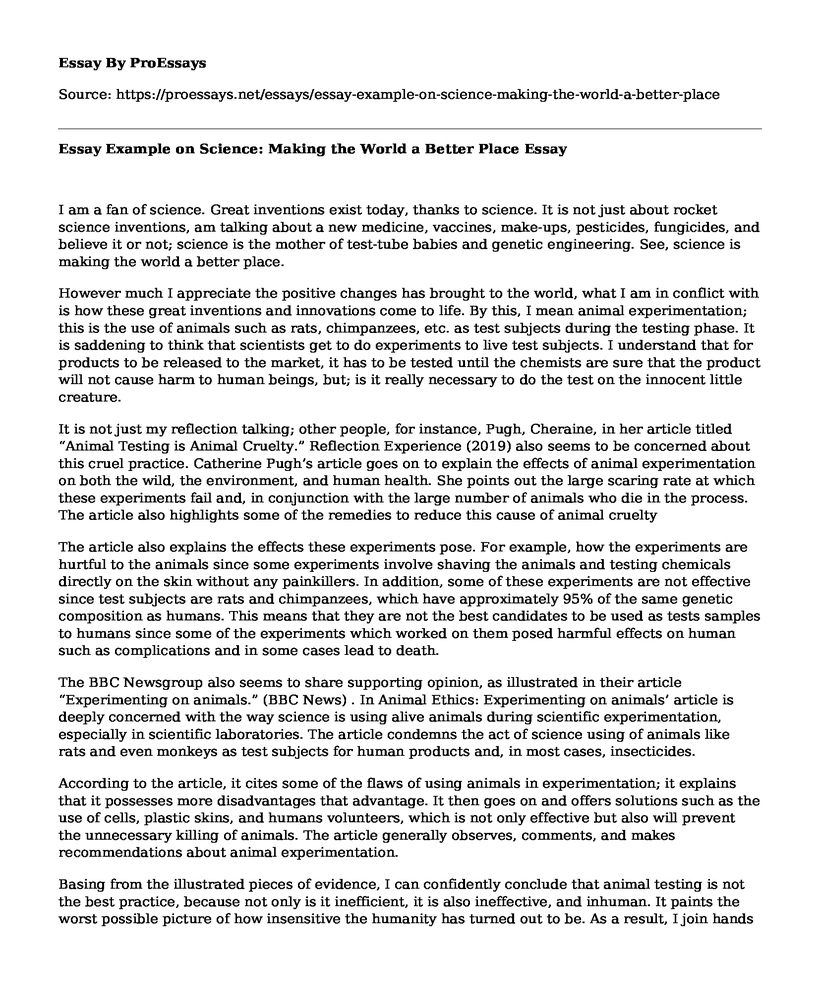I am a fan of science. Great inventions exist today, thanks to science. It is not just about rocket science inventions, am talking about a new medicine, vaccines, make-ups, pesticides, fungicides, and believe it or not; science is the mother of test-tube babies and genetic engineering. See, science is making the world a better place.
However much I appreciate the positive changes has brought to the world, what I am in conflict with is how these great inventions and innovations come to life. By this, I mean animal experimentation; this is the use of animals such as rats, chimpanzees, etc. as test subjects during the testing phase. It is saddening to think that scientists get to do experiments to live test subjects. I understand that for products to be released to the market, it has to be tested until the chemists are sure that the product will not cause harm to human beings, but; is it really necessary to do the test on the innocent little creature.
It is not just my reflection talking; other people, for instance, Pugh, Cheraine, in her article titled “Animal Testing is Animal Cruelty.” Reflection Experience (2019) also seems to be concerned about this cruel practice. Catherine Pugh’s article goes on to explain the effects of animal experimentation on both the wild, the environment, and human health. She points out the large scaring rate at which these experiments fail and, in conjunction with the large number of animals who die in the process. The article also highlights some of the remedies to reduce this cause of animal cruelty
The article also explains the effects these experiments pose. For example, how the experiments are hurtful to the animals since some experiments involve shaving the animals and testing chemicals directly on the skin without any painkillers. In addition, some of these experiments are not effective since test subjects are rats and chimpanzees, which have approximately 95% of the same genetic composition as humans. This means that they are not the best candidates to be used as tests samples to humans since some of the experiments which worked on them posed harmful effects on human such as complications and in some cases lead to death.
The BBC Newsgroup also seems to share supporting opinion, as illustrated in their article “Experimenting on animals.” (BBC News) . In Animal Ethics: Experimenting on animals’ article is deeply concerned with the way science is using alive animals during scientific experimentation, especially in scientific laboratories. The article condemns the act of science using of animals like rats and even monkeys as test subjects for human products and, in most cases, insecticides.
According to the article, it cites some of the flaws of using animals in experimentation; it explains that it possesses more disadvantages that advantage. It then goes on and offers solutions such as the use of cells, plastic skins, and humans volunteers, which is not only effective but also will prevent the unnecessary killing of animals. The article generally observes, comments, and makes recommendations about animal experimentation.
Basing from the illustrated pieces of evidence, I can confidently conclude that animal testing is not the best practice, because not only is it inefficient, it is also ineffective, and inhuman. It paints the worst possible picture of how insensitive the humanity has turned out to be. As a result, I join hands in encouraging scientists to use more effective ways of testing like: using human volunteers to test drugs and make-up products, and, in case the make-up products are too harsh to test on humans, let them use plastic skins. They can also use extracted cells of plants and animals to do tests for pesticides and fungicide products. Finally, they can use animals as test subjects only and only if it is necessary and, for that to happen, they first of all have to inject the animals with pain relievers. Also, all the results found ought to be shared out amongst all other scientists in the same niche.
Conclusion
Administration of these practices will not only ensure a definite improvement, especially in efficiency and success of scientific tests, but also it will prevent unnecessary animal brutality in the name of science. Finally, it will impose a big win on the process of product development because the testing process will be fast and efficient as a result of appropriate test samples and shared information between scientists; as the scientist proverb says, information shared is the problem half solved. The final and most important take-home is the salvation of the lost humanity as far as animal’s lives are concerned. Animals’ lives matter!
References
BBC News. “Experimenting on animals.” Animal Ethics (2014).
Pugh, Cheraine. “Animal Testing is Animal Cruelty.” Reflection Experince (2019).
Cite this page
Essay Example on Science: Making the World a Better Place. (2023, Sep 03). Retrieved from https://proessays.net/essays/essay-example-on-science-making-the-world-a-better-place
If you are the original author of this essay and no longer wish to have it published on the ProEssays website, please click below to request its removal:
- Keegan Case Study Risk Assessment
- Role of Terrorism in Homeland Security Paper Example
- Opioid Use Disorder Essay Example
- Questions and Answers on Astronomy Paper Example
- Essay Sample on Fox Hunting in Mooreland: Controversy and Exercise
- Essay Example on Ivory Trade: Destruction of Africa & Elephants
- Gender Equality: A Domestic Struggle? - Essay Sample







